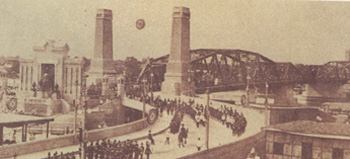|
|
|
New directions
|
New directions
After 1932, the power once exclusively the king's was to be shared by three
major blocks: government and civil service administrators, the armed forces
and a growing merchant class. In 1932,
Phraya Manopakorn Nitithada became
the first Prime Minister of Thailand,
Through the years, however, the king
remained the central focus of national
unity and, freed from the daily administration of the country, increasingly became
the symbol of moral authority.
The period immediately following
the 1932 Revolution was a fascinating
interval of experimentation with various
forms of Western parliamentary democracy. Unicameral and bicameral forms
were tried in quick succession, but neither
could be readily grafted onto a social
organism which had evolved through
many centuries of totally centralized control by absolute monarchs.
The result was a reversion to more autocratic
regimes centered on strong individual
leaders, with military backing.

On April 6, 1932, King Rama VII opened the Saphan Phut, the first bridge connecting
Bangkok with Thon Buri, to commemorate the 150th anniversary of Bangkok.
|
Two major figures, one civilian, one
military, dominated Thai politics throughout the period. Individualistic,
ambitious, fired by dissimilar visions, they
shared the common goal of putting Thailand on the path to economic and social
development. The civilian was Dr. Pridi
Banomyong, a young lawyer; the soldier
was Major Luang Pibulsonggram, a young army officer.
Dr. Pridi gained early prominence
when, shortly after the coup, he unveiled
a very innovative and highly socialistic
plan for economic development. He
believed that Thailand could best prosper
if national and industrial resources were
nationalized and people, with few exceptions, became state employees.
Branded a radical, his vision was
bitterly opposed by conservative officials
and military officers whose subsequent
political maneuvers forced him into temporary exile.
An attempted right-wing countercoup in 1933 saw Major Pibul gain
ascendancy, and a year later he was appointed to the cabinet of Prime Minister
Phraya Phahol Polphayuhasena, one
of the major leaders of the 1932 coup.
The exonerated Dr. Pridi was appointed Interior Minister to guarantee
civilian support. Throughout this period
each of the two men tried to consolidate
a base of power, Col. Pibul through the
military and Dr. Pridi through the country's intellectual community and, through
the foundation of Thammasat University, its students.
In 1938, Phraya Phahol resigned
and Lt, General Pibul succeeded him
as Prime Minister. In conformity with
his view that a strongly enforced discipline backed by military strength was
vital for Thailand's development he
aimed at focusing nationalism to maximum intensity. He continued this
policy until, in 1941, he was forced into
collaboration with the occupying Japanese. Dr. Pridi, during the same
period, was sympathetic to the Allies and
worked with Thailand's underground resistance movement.
Toward the end of World War II,
Field Marshal Pibul and his collaborative
government resigned, and Khuang Apaivongse became the Prime Minister in
1944. In the following year King Ananda
Mahidol (Rama VIII) returned from
Switzerland, and Dr. Pridi became prime
minister in 1946. But the unexpected
death of King Ananda Mahidol generated
popular dissatisfaction and once again
the tide turned. Dr. Pridi was forced
into exile, and Field Marshal Pibul again assumed power.
This time his period of leadership
was to be a long one. It would witness
the establishment of parliamentary democracy in Thailand and see the
emergence of the country's students as a
powerful political force whose protests
contributed to Field Marshal Pibul's eventual overthrow. In 1946, Thailand joined
the United Nations, recognizing the
future importance of the U.N.'s role in
securing world peace. In 1950, shortly
after the outbreak of war in Korea, Thailand announced her support of United
Nations intervention and promptly sent
a 2000-man fighting force, smaller naval
and air force contingents and several tons of rice.
Economically, the establishment
of the People's Republic of China discouraged Thailand's Chinese from
sending monthly remittances and encouraged
local assimilation which stimulated local
growth and profits. As world demand
for food products rose, the countryside
began diversifying away from the rice
monoculture. And in response to local
demand, enterprising producers founded
light manufacturing industries on city and town outskirts.
In 1957 the premiership changed
from Field Marshal Pibul to Field Marshal Sarit Thanarat. The Government
under his vigorous personal leadership
apparently satisfied the requirements of
the ever-burgeoning population by emphasizing economic development and
national security. As a consequence of
these decisive actions and policies, Field
Marshal Sarit provided the nation with
a sound infrastructure which successive
governments could easily continue and adapt.
Following the sudden death of Field
Marshal Sarit in 1963 Field Marshal Thanom Kittikachorn was appointed Prime
Minister. The Government led by Field
Marshal Thanom not only concentrated
on internal social and economic development but also promoted the stability of
the region as a whole. Indeed, it was
primarily through the initiative of Thailand
that the Association of Southeast Asian
Nations (ASEAN) was established in
1967 in accordance with the Bangkok
Declaration. However, in response to
unprecedented political confusion
caused by a student uprising in October
1973 Field Marshal Thanom relinquished
the premiership in favor of Professor Sanya Dharmasakti.
During the period 1973-1976 the
Thai political arena witnessed successive
governments headed by Professor Sanya
Dharmasakti, M-R. Seni Promoj, M.R.
Kukrit Promoj, again M.R. Seni Pramoj, and finally Dr. Tanin Kraivixian
each of which strove to develop the
country in its own way.
In 1977 General Kriengsak Chammanand became the new Prime Minister.
His government maintained political stability, which successfully encouraged
foreigners to invest in Thailand.
During Prime Minister General Prem
Tinsulanonda's years of leadership since
1979, insurgency-caused internal conflicts have been greatly reduced. Many
groups of insurgents have emerged from
their jungle hideouts to peacefully surrender to the government officials.
General Prem's government also maintains
friendly relations with all nations and international organizations.
Consequently, national stability and successful
foreign policies have brought about a
great many socio-political and economic developments.
|
| | |
|
|